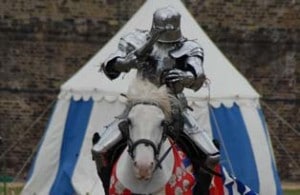 Queen Anne Boleyn attended the traditional May Day joust at Greenwich Palace on 1st May 1536 with her husband Henry VIII. She did not know that court musician Mark Smeaton had been apprehended and interrogated over night, but she may have had an inkling that all was not well following an argument she’d had with her husband the previous day.
Queen Anne Boleyn attended the traditional May Day joust at Greenwich Palace on 1st May 1536 with her husband Henry VIII. She did not know that court musician Mark Smeaton had been apprehended and interrogated over night, but she may have had an inkling that all was not well following an argument she’d had with her husband the previous day.
In his poem De la royne d’Angleterre, Lancelot de Carles, secretary to the French ambassador, writes of the May Day joust, describing how “The King was friendly to all,/ And gave them the touch of his hand,/ Concealing their coming ruin.” He also describes how Sir Henry Norris was armed and ready to joust, but his horse refused to run. The King stepped in and offered Norris his own horse – an act of kindness and chivalry, although de Carles points out that the King knew that Norris “could not keep it long”.1 The Queen’s brother, George Boleyn, was also involved in the joust. He led the challengers and Norris led the defenders.
Suddenly, the happy spell of this May Day was broken. The King suddenly got up, abandoning his wife, and ordering Norris, his Groom of the Stool, to ride with him to Westminster. According to George Constantine, one of Norris’s servants, the King interrogated Norris the whole way and offered him a pardon “in case he wolde utter the trewth”.2 Gilbert Burnet, Bishop of Salisbury, corroborated this offer of a pardon, writing that Norris said “that in his conscience he thought her innocent of these things laid to her charge; but whether she was or not, he would not accuse her of anything; and he would die a thousand times, rather than ruin an innocent person.”3 Norris’s pleas of innocence fell on deaf ears; he was arrested and taken to the Tower of London the following morning.
Had Mark Smeaton implicated Norris or was it all down to Anne Boleyn’s altercation with him over “dead men’s shoes”? It’s impossible to know, but the The Spanish Chronicle, which is to be taken with a hefty pinch of salt, tells of how Cromwell sent a copy of Smeaton’s confession to the King and it was this letter which made the King leave the joust so abruptly with Norris.4
Notes and Sources
- Ascoli, Georges (1927) La Grande-Bretagne Devant L’opinion Française Depuis La Guerre De Cent Ans Jusqu’à La Fin Du XVIe Siècle. Paris, vv. 495–512. English translation from Anne Boleyn, Lancelot de Carle, and the uses of documentary evidence, Schmid, Susan Walters, Ph.D., ARIZONA STATE UNIVERSITY, 2009, p135
- George Constantine, Archaeologia, or, Miscellaneous Tracts Relating to Antiquity, Vol 23, p 64.
- Burnet, Gilbert (1865) The History of the Reformation of the Church of England, p206
- Hume, Martin Andrew Sharp (1889) Chronicle of King Henry VIII. of England: Being a Contemporary Record of Some of the Principal Events of the Reigns of Henry VIII. and Edward VI. Written in Spanish by an Unknown Hand, p62–63.